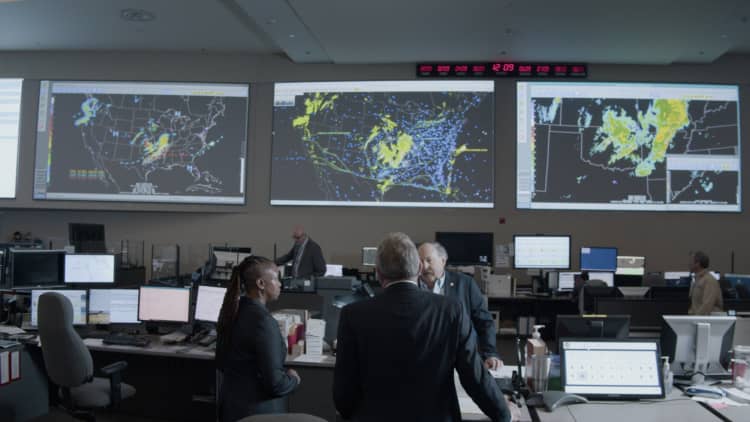Orange balls of light fly across the sky as debris from a SpaceX rocket launched in Texas is spotted over Turks and Caicos Islands, January 16, 2025 in this screen grab obtained from social media video.
Marcus Haworth@marcusahaworth | Marcus Haworth Via Reuters
Several commercial flights were diverted or delayed after SpaceX’s Starship rocket broke up during its seventh flight test on Thursday.
Dozens of flights were affected, according to flight-tracker Flightradar24.
The Federal Aviation Administration said it “briefly slowed and diverted aircraft around the area where space vehicle debris was falling” after it issued a warning to pilots about “dangerous area for falling debris of rocket Starship.”
The rocket took off from SpaceX’s facility near Brownsville, Texas, shortly after 5:30 p.m. ET, and was headed east from Texas. It broke up and SpaceX said on X that it will “continue to review data from today’s flight test to better understand root cause.”
The FAA has not received any reports of injuries or property damage from Starship’s debris, a spokesperson for the agency told CNBC.
A JetBlue Airways flight from Fort Lauderdale, Florida, to San Juan, Puerto Rico diverted back to Fort Lauderdale, almost two hours into the flight, according to FlightAware, another flight-tracking site. JetBlue didn’t immediately respond to a request for comment.

Other flights near Turks and Caicos, including a FedEx cargo jet appeared to turn around, according to flight-tracking data, while a Spirit Airlines plane also changed course.
The airlines and SpaceX didn’t immediately respond for request for comment on the disruptions.
An American Airlines spokeswoman said the carrier had fewer than 10 diversions because of the issue.
Delta Air Lines said it diverted four flights to or from destinations in the Caribbean to other airports because of the debris warnings.
Airlines and other commercial flights, as well as private planes, compete for airspace, especially in the congested area around Florida, but impacts can range depending on the launch.
Australia’s Qantas Airways said it had to make last-minute delays to several flights between Johannesburg and Sydney on advice from the Federal Aviation Administration on the re-entry of SpaceX rockets over a large swath of the Indian Ocean.
“While we try to make any changes to our schedule in advance, the timing of recent launches have moved around at late notice which has meant we’ve had to delay some flights just prior to departure,” said Ben Holland, head of the airline’s operations center. “Customers generally understand this is outside of airlines’ control and that we can’t fly in the area when the rocket re-entry is taking place. We’re in contact with SpaceX to see if they can refine the areas and time windows for the rocket re-entries to minimise future disruption to our passengers on the route.”
— CNBC’s Michael Sheetz contributed to this report.










